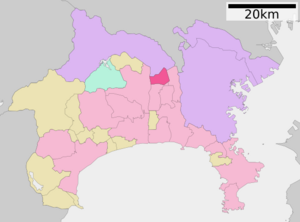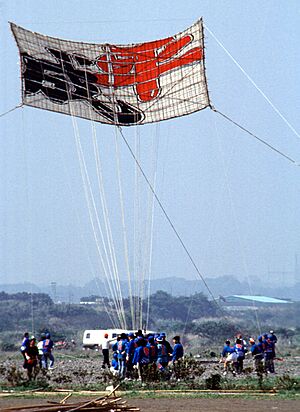Zama, Kanagawa facts for kids
Quick facts for kids
Zama
座間市
|
|||
|---|---|---|---|

Zama City Hall
|
|||
|
|||

Location of Zama in Kanagawa Prefecture
|
|||
| Country | Japan | ||
| Region | Kantō | ||
| Prefecture | Kanagawa | ||
| Area | |||
| • Total | 17.58 km2 (6.79 sq mi) | ||
| Population
(June 1, 2021)
|
|||
| • Total | 130,667 | ||
| • Density | 7,432.7/km2 (19,251/sq mi) | ||
| Time zone | UTC+9 (Japan Standard Time) | ||
| Symbols | |||
| • Tree | Osmanthus | ||
| • Flower | Sunflower | ||
| • Bird | Japanese tit | ||
| Phone number | 046-255-1111 | ||
| Address | 1-1-1 Midorigaoka, Zama-shi, Kanagawa-ken 252-8566 | ||
Zama (座間市, Zama-shi) is a city located in Kanagawa Prefecture, Japan. As of June 1, 2021, about 130,667 people live there. It's quite a busy place with about 7,400 people living in each square kilometer. The city covers an area of 17.58 square kilometers.
Zama is also home to Camp Zama, a base for the United States Army.
Contents
Geography of Zama
Zama is in the middle of Kanagawa Prefecture. It's about 50 kilometers (31 miles) from Tokyo and 20 kilometers (12 miles) from Yokohama.
The city has two main parts. There's a flat area near the Sagami River in the west. In the east, there's a higher, flat area called the Sagamino Plateau. The Hikiji River, Mekushiri River, and the Hato River all flow through Zama. The city is also famous for its drinking water. It stays cold in summer and warm in winter!
Neighboring Cities
Zama is surrounded by several other cities in Kanagawa Prefecture:
- Sagamihara
- Atsugi
- Yamato
- Ebina
Zama's Climate
Zama has a climate with warm summers and cool winters. Sometimes there's a little snow, but not much. The average temperature in Zama is about 14.4°C (57.9°F) each year. September is usually the wettest month. The hottest month is August, with temperatures around 25.3°C (77.5°F). January is the coldest, at about 3.6°C (38.5°F).
Population Growth in Zama
The number of people living in Zama has grown a lot over the last 70 years.
| Historical population | ||
|---|---|---|
| Year | Pop. | ±% |
| 1950 | 11,810 | — |
| 1960 | 15,402 | +30.4% |
| 1970 | 56,727 | +268.3% |
| 1980 | 93,503 | +64.8% |
| 1990 | 112,102 | +19.9% |
| 2000 | 125,694 | +12.1% |
| 2010 | 129,436 | +3.0% |
| 2020 | 132,325 | +2.2% |
History of Zama
People have lived in the Zama area for a very long time. We know this because tools and items from the Jōmon period (an ancient time in Japan) have been found here.
Long ago, a small village called "Izama" was a rest stop on the old Tōkaidō road. This road connected Kyoto with other parts of Japan. During the Edo period, the area was directly controlled by the Japanese government.
Modern Development
Zama was mostly farmland until trains arrived. The Odakyu Electric Railway came in 1927, and the Sagami Railway in 1935. These trains helped the area grow. In 1937, the Imperial Japanese Army Academy moved to Zama. This brought more people, and Zama became a town that same year.
Later, in 1941, Zama town joined with Sagamihara. During World War II, a naval factory was built here. After the war ended, this factory closed. The Army Academy became Camp Zama for the United States Army.
In 1948, Zama became a town again, separate from Sagamihara. The local economy got a big boost in 1965 when a Nissan car factory was built in Zama. Other factories also came. Finally, on November 1, 1971, Zama officially became a city.
Zama's Economy
In the past, Zama's economy was mostly about growing mulberry trees for the silk industry. In the 1930s, Zama became more industrial. Factories started making equipment for the Japanese military. Later, in the 1950s and 1960s, car parts and cars were made here.
However, the Nissan car factory closed in 1995. This made the economy in Zama a bit harder. Now, many people who live in Zama travel to work in nearby Sagamihara, Yokohama, and Tokyo. This means Zama has become a "commuter town."
Here's a look at how people work in Zama:
- Agriculture (farming): 0.6% of workers
- Manufacturing (making things in factories): 29.8% of workers
- Service (jobs like shops, hospitals, and offices): 68.0% of workers
Education in Zama
Zama has many schools for kids. The city government runs 11 public elementary schools and six public middle schools. For older students, there are three public high schools. These are managed by the Kanagawa Prefectural Board of Education. There's also a special education school for students with disabilities.
Getting Around Zama
Train Lines
![]() Odakyu Electric Railway – Odakyu Odawara Line
Odakyu Electric Railway – Odakyu Odawara Line
- Zama
- Sōbudai-mae
![]() JR East – Sagami Line
JR East – Sagami Line
- Iriya
Main Road
 National Route 246
National Route 246
Sister City
Zama has a special friendship with a city in the United States:
Fun Places to Visit in Zama
- Zama Yatoyama Park
- Zama Park
- Himawari Park
- Kanigasawa Park
- Fujiyama Park
- Onsen (There are 15 hot springs in the city!)
Famous People from Zama
Many talented people come from Zama, including:
- Alcvin Ryuzen Ramos, a Shakuhachi Flute Player and Maker
- Ami Suzuki, a Singer, Songwriter, Actress, and Dancer
- Danny Lee Clark, an Athlete, TV Personality, Author, Actor, and Producer
- Erina Mano, an Actress and Singer
- Keiichiro Koyama, a Musician
- Koyuki, a Model and Actress
- Nanako Matsushima, an Actress and Model
- Naoya Inoue, a Boxer and Super Bantamweight Champion
- Saki Shimizu, a Singer
- Sakura Oda, a Singer
- Shinobu Ohno, a Female Footballer
- Suzuka Ohgo, an Actress
- Tomoko Ishimura, a Voice Actress
- Shotaro Osaki, a Member of the K-Pop Boygroup Riize
Images for kids
See also
 In Spanish: Zama (Kanagawa) para niños
In Spanish: Zama (Kanagawa) para niños
 | John T. Biggers |
 | Thomas Blackshear |
 | Mark Bradford |
 | Beverly Buchanan |












